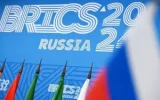BRICS benefits for Iran’s energy

According to Energy Press; In recent years, energy cooperation between the BRICS countries has been successfully developed both in the field of traditional energy such as hydrocarbons and in the field of nuclear energy. In this regard, the volume of Russian energy exports to other BRICS countries, primarily to China and India, has increased significantly, especially after the sanctions against Russia by Western countries.
However, these collaborations remained largely on paper. Because in the field of international energy diplomacy, the possibility of BRICS functioning as an organization is limited due to the fundamentally different interests of its participants and the divergence of their interests in relation to the price level of energy sources and also in relation to the use of renewable energy sources and fossil fuels. Because each country faces its own challenges in the development of the fuel and energy sector, and they set different development goals.
As a result, investment cooperation has not taken a proper place in the energy sector of the BRICS countries, and many areas of bilateral cooperation that were previously announced between the BRICS countries (with the exception of their cooperation with Russia) have not been properly developed. Moreover, based on the state of India-China relations, there is no reason to expect any energy cooperation to develop between these two major economies of the world and their neighboring countries.
Russia showed the most activity in the development of energy cooperation during this period. In this regard, the first meeting of energy ministers of the BRICS countries was held in 2015, which established the basic foundations of the institutionalization of cooperation in the field of energy within the framework of this association.
In the same year, Russia took the initiative to save energy, increase energy efficiency and develop energy efficient technologies. Therefore, a relevant working group was created under the supervision of the Ministry of Energy of the Russian Federation, which drafted a memorandum of understanding in this regard between the ministries and departments of the BRICS countries.
In line with the results of the third meeting of BRICS Energy Ministers on June 28-29, 2018 in Johannesburg (South Africa), the partners of the association supported another Russian initiative, namely the launch of the BRICS Energy Research Platform. This platform was approved on November 11, 2019 following the fourth meeting of BRICS energy ministers in Brasilia (Brazil). Currently, the Energy Research Platform brings together about 100 experts from BRICS countries, representing specialized research centers, companies and universities.
The BRICS Energy Platform has 14 main areas of action, including energy research, technology cooperation, coal and gas sectors including LNG, digitalization, renewable energy, bioenergy, sustainable transport, energy efficiency, smart grids, capacity building, hydrogen energy, as well as cooperation in financial and energy standards.
In 2020, at the initiative of Russia, the road map of energy cooperation between BRICS countries until 2025 was prepared and approved, which is the most important strategic document on the basis of which energy dialogues between member countries are developing in general, despite the problems of energy cooperation between BRICS countries. It is still developing, although many of the existing initiatives are not yet implemented and are mainly being developed as ideas.
BRICS expansion
As of January 1, 2024, the number of BRICS member countries doubled, and based on the decision of the 15th BRICS summit in August of last year; Egypt, Iran, UAE, Saudi Arabia and Ethiopia joined BRICS as members. Now BRICS+ controls 45.4% of the world’s population and 30.4% of the earth’s landmass.
Undoubtedly, with the entry of five more BRICS countries, it will significantly increase its role in the energy market. Saudi Arabia, UAE and Iran are major producers and exporters of oil, whose presence in BRICS has increased its share in global production to 42.56%. Also, Iran and Saudi Arabia are major producers of natural gas, and BRICS now accounts for 33.36% of the total global production.
The new BRICS members must jointly resolve the main obligations and duties previously determined by the BRICS countries. In particular, in accordance with the BRICS Economic Partnership Strategy until 2025, the BRICS countries are taking steps to solve their tasks in the field of energy, which include intensifying interaction in the field of technological and innovative cooperation, especially in the field of energy, using the BRICS Energy Research Platform and Roadmap. BRICS energy cooperation until 2025, carrying out activities to ensure energy security and stability in global energy markets, promoting balanced development and use of non-renewable and renewable energy sources, promoting cooperation in the field of renewable energy sources within the framework of BRICS.
Tags:BRICS
- Comments sent by you will be published after approval by site administrators.
- Comments that contain slander will not be published.
- Comments that are not in Persian or not related to the news will not be published.

Comments
Total comments : 0 Awaiting review : 0 Date: 0